Is your picky toddler not eating? It happens to all of us at one time or another. Here’s why it might be happening…and what you can do to make it better (or at least how to know what’s normal so you can relax).
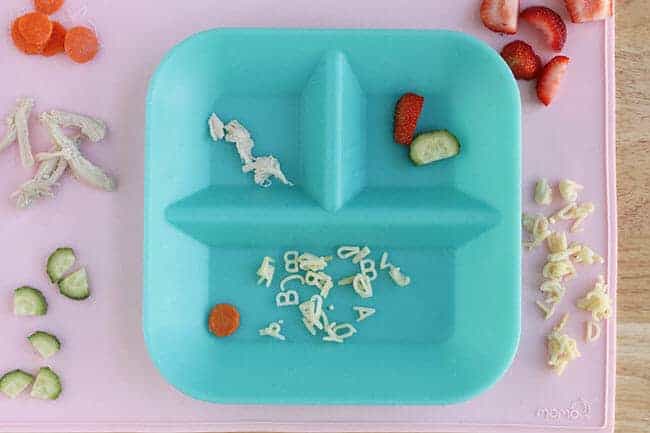
Picky Eating in Toddlers
You get everyone to the table and bring out the food. Your toddler won’t eat, throws a fit, or fusses. No matter how hard you try, this is often the reality of feeding toddlers. The good news is that a toddler not eating is actually quite normal.
The bad news? It’s a difficult thing to know exactly why your toddler isn’t eating—and what exactly you should do about it.
But there are simple steps you can take to improve the situation.
Toddler Not Eating? Here’s What to Do
Family meals are a chance to be together at the end of a long day, to enjoy food, and to create daily rituals and routines. But when a toddler won’t eat, whether at the family table or not, it can throw off even the best of intentions. And it can make meal time a huge source of stress.
The reasons a toddler won’t eat are unique to each kiddo and situation, so I’m going to try to be as comprehensive as possible here.
Your toddler won’t eat? Help is here!
Sign up for our email updates to get tips and ideas sent to your inbox.
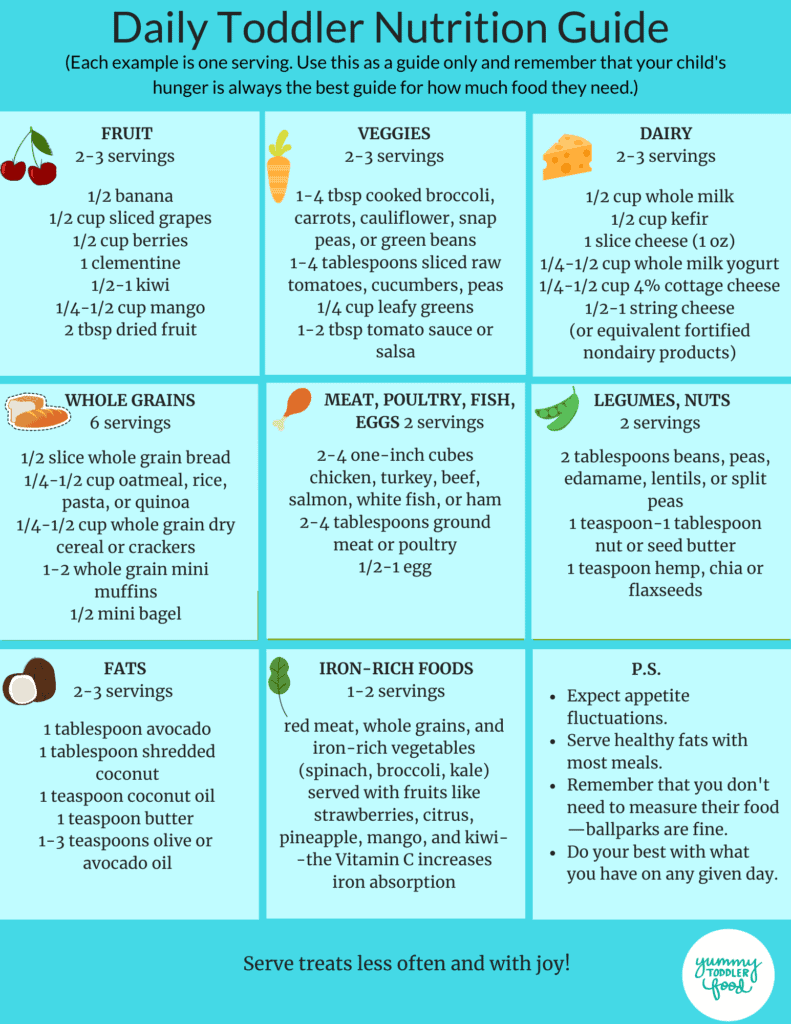
Daily Toddler Nutrition
For a quick reference, you can download my Printable Toddler Nutrition Guide so you can refer to it for reassurance and information. Use it as a guide, not a hard-and-fast rule, since kids aren’t robots and will not eat like a chart. I share this first because portion sizes may actually be a lot smaller than you realize and often we are simply overestimating the amount that our kids need.
(Aim to serve healthy fat with most meals or snacks since little kids need it for proper brain development.)
Why does my toddler refuse to eat?
It’s very possible your toddler’s not eating because he simply isn’t as hungry as he was when he was a baby. Toddlers grow less rapidly than babies and may be less hungry and need less food than you expect. If you give them a larger portion size than they need, they may eat some and leave the rest—and it may visually look like they haven’t eaten anything even though they did.
And toddlers don’t always have the words to be able to effectively communicate that they aren’t hungry, so they may just refuse to eat. This may look like playing with food, throwing food, or flat-out refusing to have anything to do with food.
A normal toddler meal may be two bites of a food. Or it may be a whole plate. A normal toddler may like something immensely one week and not at all the following week.
This is to be expected and is 100% normal.
Or, it’s entirely possible that once they have it in their head that they don’t want something, they won’t eat it. Sometimes not wanting dinner is about power. Toddlers are in the developmental stage where it’s normal for them to test boundaries. They are learning what they can and cannot do and the effects their actions have—both at the table and away from it.
Talk with the rest of your family about how to create some structure around meals—when they happen, where they happen, who sits where, if music is playing, if phones are put away—to help your child know what to expect. Toddlers thrive on routine and attention.
Try:
- Consider using only water between meals and snacks (to avoid filling bellies up with milk or juice if that’s a potential issue).
- Serve very small portions to start to avoid wasting food or overwhelming the kids with large portions. Think a single piece of broccoli, one chicken nugget, or one small scoop of yogurt to start.
- Create some mealtime structure so there are set expectations at the table. This could be as simple as always sitting down at the dining table or the kitchen counter.
- Let it be ok if a child isn’t as hungry as you expect them to be. (The Division of Responsibility can be helpful here.)
product we love
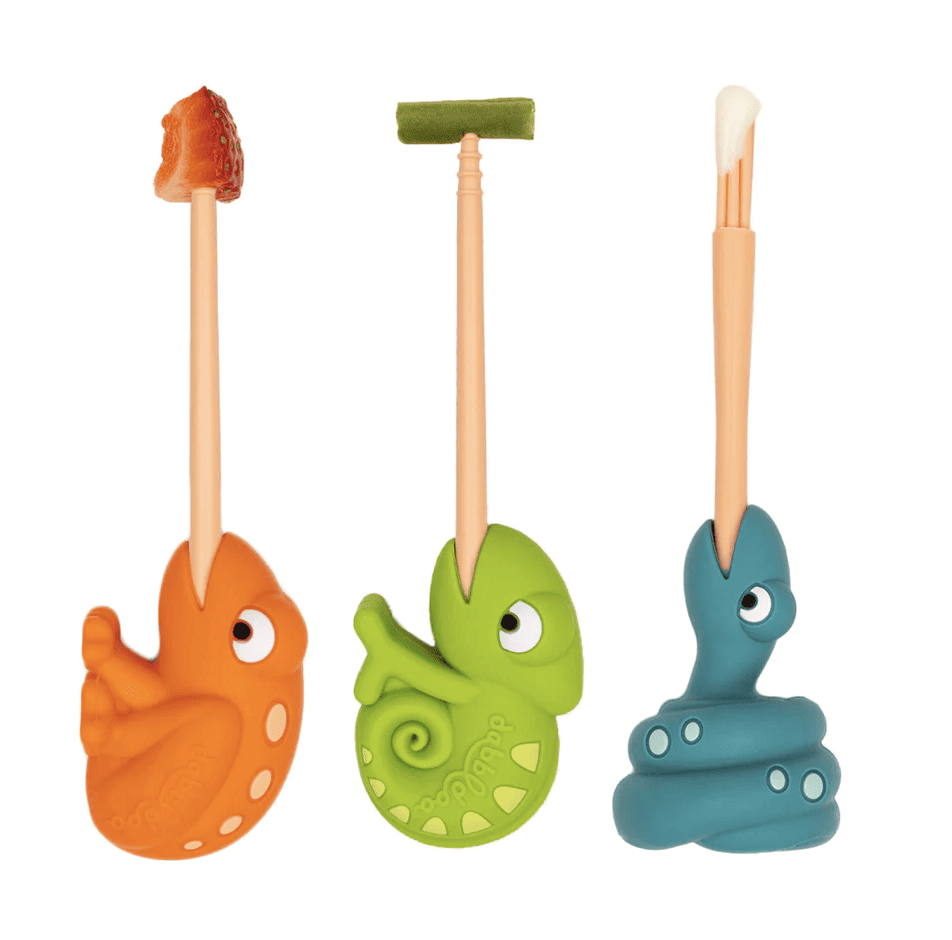
Dabbldoo Food Picks
Introducing a fun utensil can help your toddler relax and get excited about eating. Our favorite food picks are specifically designed to be safe and effective for toddlers. These are used by feeding professionals and parents to help kids explore and try new foods every day. (sponsored)
How do I get my picky toddler to eat?
There are a few ways to rethink this issue. First, if you are in the habit of short-order-cooking the foods you know your toddler will eat, you may want to consider stopping. Explain to your kids that we’re having such-and-such tonight but that you will make their requested favorite food soon. Then follow through so they know they can trust you!
Then, make sure there are 1-2 foods on the table that the child usually likes, even if it’s something simple like fruit or cheese. Surround them with the food you want them to eat and let them decide what and how much of it to eat.
Using this Division of Responsibility in Feeding approach to meals can be a total GAME CHANGER, as it clearly delineates what the parent and child are each responsible for at the table, lessening pressure on everyone. It also gives the child a chance to stay in touch with their own hunger cues without prodding, pushing, or cajoling—which has the added benefit of helping to make mealtimes more enjoyable for you, too.
We want our kids to know their own hunger and fullness cues so they know how much to feed themselves as they grow into adolescents and adults when we aren’t around. And those cues can be hard to tap into if they are constantly overridden by external cues (like if we push them to eat a certain amount), however well-intentioned.
You can also try to involve them in doing something to help get ready for the meal to distract them from their concern about what’s for dinner. Try letting them help to set the table, help with simple meal prep (like washing veggies), or wash their hands. Hand washing is an excellent toddler-diversion tactic when they get upset about something.
If you are okay with cooking separate meals for your kids because it works better for you right now to know they will eat the food you make, then by all means, do that.
But if you’re wanting your child to eat family meals and eventually eat more of the same foods as the rest of the family, then try the tips I just shared above.
Remember: Even if you follow all feeding advice “perfectly”, your child may still eat differently than you expect. That is normal.
It is incredibly difficult to accurately estimate someone else’s hunger. I am a big proponent of moving from the goal of “getting the kids to eat” towards “how can I make mealtimes happier for all of us?”.
TIP: Almost every toddler is “picky” in one way or another at some point. Toddlers are quirky, it’s part of the fun! (And the challenge, of course.)
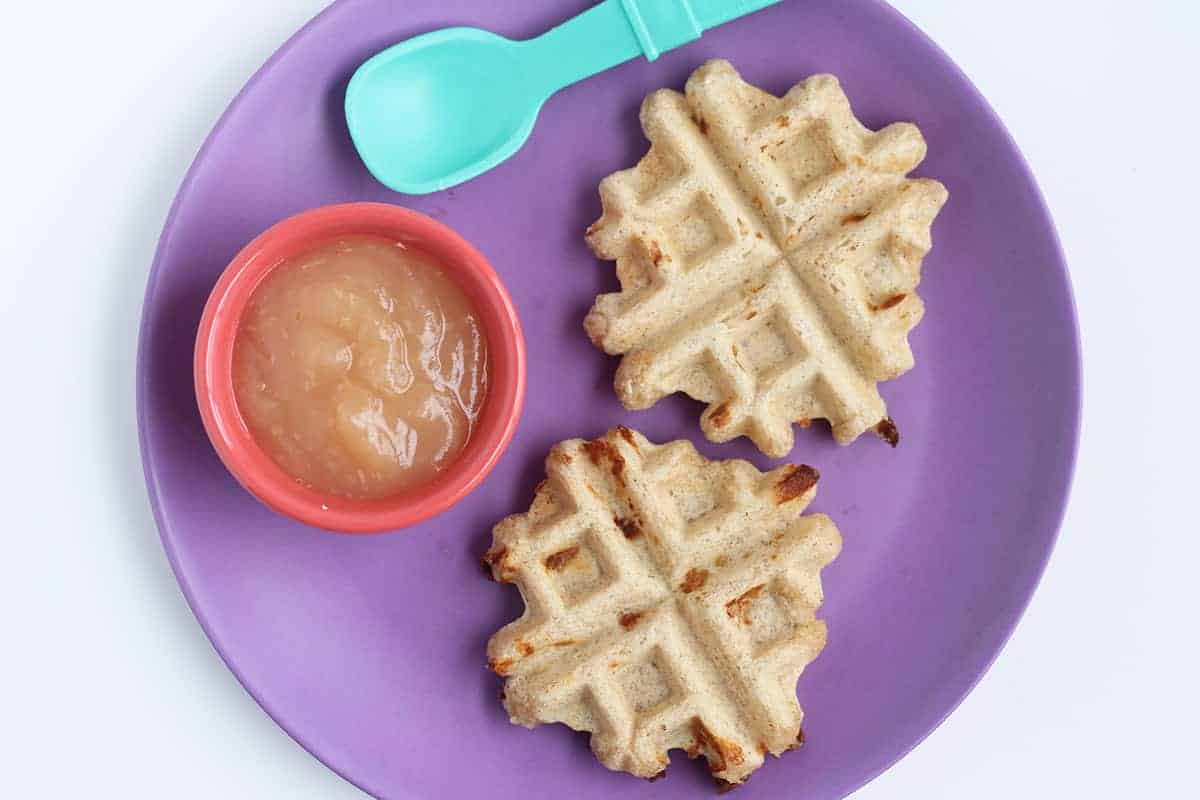
Why did my toddler stop eating?
If your child is playing with their food rather than eating it at the start of the meal, chances are they aren’t hungry enough to eat. Take a break and try again in 30 minutes if possible—or for the next snack or mealtime.
If your child just doesn’t seem hungry for any food or much food, consider how long it’s been since their last meal or snack, how much milk (or juice) they’re drinking throughout the day, how much they ate at their last meal or snack, and whether they are teething or tired or otherwise off.
It’s very possible a toddler won’t eat simply because they aren’t as hungry as you expect them to be.
Or they may be hungrier earlier in the day and taper off with their intake as the day goes on.
If your toddler won’t eat foods he once liked, try serving them in new ways—such as cutting carrots into sticks rather than rounds before cooking them, but also remind yourself that it’s normal for toddlers to go through phases of loving and not loving foods. They may be obsessed with blueberries one week and not want them again for two months.
It’s possible they simply need a break from having certain foods as frequently. That is OK. (And very relatable!)
Try:
- Serve very small portions to start to keep your own expectations of how much they should be eating in check. Then, allow seconds (or thirds) according to the kiddo’s hunger.
- Space out meals to 2-3 hours apart to allow time for hunger to build. And remember that their hunger may change during different phases of growth.
- Remember that there are simply times when kids aren’t hungry or aren’t as hungry as we expect. That is not a sign of pickiness, just their way of telling us that they aren’t hungry at that moment.
What if a toddler won’t eat anything but snacks?
Often, if a toddler knows there is a snack ahead that includes traditional “snacky” foods, they won’t eat the meal you are serving. It can help to serve “regular” food at snack time, instead of relying on crackers and fruit snacks, and serve classic “snack” foods with meals. This can even out the appeal of all food intake opportunities.
In other words, think of snacks as mini meals and serve all types of foods at each eating opportunity.
Kids often relax when they have access to their favorite foods, so there’s nothing wrong with serving Goldfish crackers along with strawberries and a hard-cooked egg. Or a chocolate chip snack bar with a banana and carrot sticks. It’s all good!
When it comes to feeding, the best thing you can do is to give your child lots of low-pressure opportunities to see (and maybe) eat a range of foods—while still offering foods your kids you know your kids usually eat. It’s all about balance…for everyone involved.
It still counts as an exposure even if a child doesn’t eat a food. They can touch it, see it, learn what it’s called, and add to their food literacy—which can be helpful over time as they grow.
Try:
- Buy more of the foods you want your kids to eat, but still include foods they love so they avoid feeling restricted.
- Serve small mini meals at snack time instead of traditional “snack” foods and incorporate more traditional “snacks” into meals—like crackers alongside soup, for example.
- Think of all eating opportunities as “mini meals” and serve all foods at all times to lessen the appeal of “snack” a little.
- Stick with a routine for meals and snacks by having them at set times (roughly) and avoiding all day grazing.
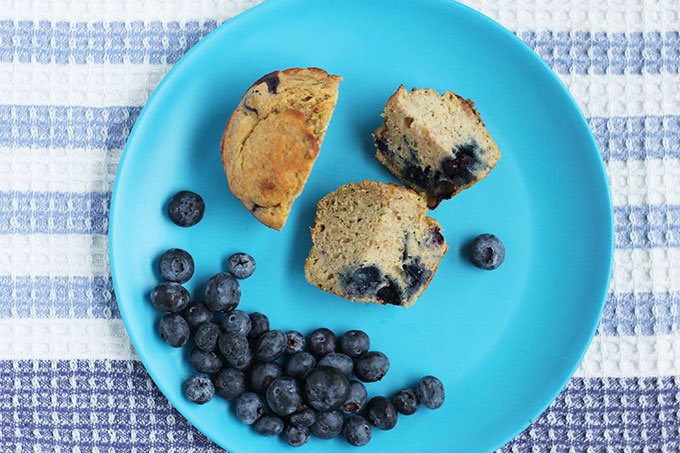
Is it normal for my toddler to refuse to eat?
There will be times when your toddler simply doesn’t like a meal you make. And whether it’s the texture, flavor, appearance, or the way the wind is blowing, we may never know, but it will happen. Or, a toddler won’t eat at times because they are either not that hungry or they know you will get them something they prefer if they refuse.
A child will usually choose a more familiar, fun, and safe food when given the chance. But if you pair safe foods with other ones, they can gently expand their accepted food range. Or, at the very least, have those exposures to other foods (even if they don’t eat them yet).
My method is to make family dinner, including 1-2 foods per meal that the kids usually like even if those foods are a simple side of fruit and milk. Then, if they don’t want to eat, I can trust that they aren’t hungry.
This is a very reliable method if you do it regularly. I do realize this is hard when it’s 6 p.m. and your little one hasn’t eaten a thing for dinner. If that happens and they legitimately seem hungry after dinner, wait at least 30 minutes (so they don’t feel rewarded for refusing dinner) and offer a super boring bedtime snack like a banana. If they are hungry enough for boring food, you know they are hungry!
If your toddler seems to legitimately dislike a meal, you can institute a “backup meal” to give them the chance to satisfy hunger. Choose something plain that they would likely never choose to eat by themselves and offer that and that alone so you don’t have to negotiate in the moment. (To me, this is something that should be used very rarely since it can create more work, especially if you have multiple children.)
Good backup meal options in our house are plain yogurt with granola, plain toast with nut butter, a scrambled egg, or a bowl of cereal. We keep the options plain.
Try:
- Avoid getting up during a meal to get different food at your toddler’s request. Instead, aim to include 1-2 foods they usually like in any meal to ensure they always have something to eat.
- Ask the kids (who can communicate verbally) to choose between options for dinner, such as choosing which vegetable or side dish to have from two options you have on hand. Kids like to be involved in making decisions!
- Serve a boring bedtime snack if they didn’t eat dinner and seem hungry before bedtime.
- Have one boring “backup” meal option for those rare nights when they legitimately don’t like the dinner on offer—something they probably wouldn’t ask for but are happy enough to eat if hungry.
My toddler won’t eat because he’s sick. Should I worry?
When toddlers are sick, normal eating very often goes out the window. With any illness, appetites can decrease. The general rule that our pediatrician always shares is that as long as they are drinking and going to the bathroom normally, then you shouldn’t need to worry too much.
Keep portion sizes small, keep the actual foods simple, don’t push food too hard, and trust that their little bodies are doing what they need to feel better. You can get back to normal eating when they are feeling better, and you can always check in with your doctor.
Be patient since lower appetites can linger longer than you might expect, even once a child starts to feel better. And of course, check with your doctor if they aren’t drinking, there’s another red flag, or you just need reassurance from a medical professional.
Also, toddler teething can cause reductions in hunger. Try not to expect that your toddler will eat normally when they are cutting teeth (especially not with molars!) and instead offer them plenty of liquids, chilled foods, and things that don’t require too much chewing—smoothies, yogurt, pasta, popsicles—to help avoid irritating their already sore gums.
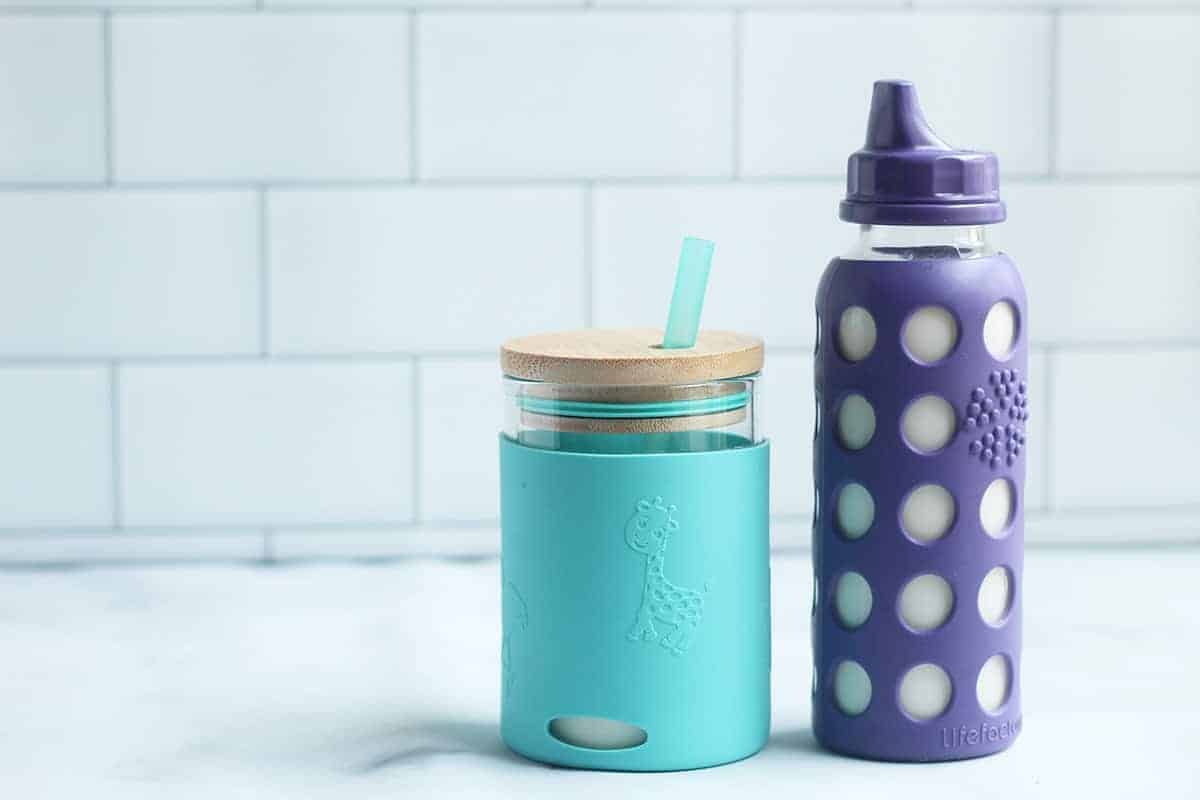
My toddler won’t eat anything but milk. Help!
If you have a toddler who’s not eating but drinks lots of milk, it’s possible that milk is filling their bellies and reducing hunger for other food. (The same can be said for any other food that they are insisting is the only food they want.)
The AAP recommends toddlers have 2-3 serving of dairy a day, which includes milk and other dairy foods like cheese and yogurt. A serving of milk for a toddler is ½ cup. Try serving a smaller portion of milk just at meals and offering water in between. (You may need to do this gradually, especially since milk is often a comfort food.)
Keep portion size in mind, especially if your toddler won’t eat anything but milk, since cups and bottles can be quite large. This 4-ounce sippy cup is a nice size to use at meals since it ensures that a toddler won’t fill up on milk and will be more likely to have room in their bellies for some food. A very small juice glass works, too.
You may need to taper down the volume in bottles if that’s how they’re consuming their milk.
Try:
- Serve milk at meals and offer water in between.
- Serve milk in a small cup (or a smaller cup than you have been using) to help avoid serving too much at once.
- Start to decrease the volume of milk in bottles and work on moving milk to meals, rather than as separate feeding around 18 months.
- Remember that milk is often comforting for kids, so you may need to take a gradual approach with this.
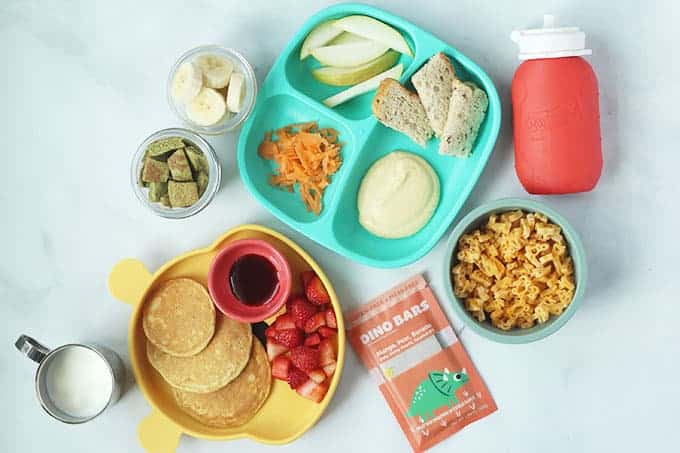
How can I increase my toddler’s appetite?
Why do you want to increase your toddler’s appetite? Are you worried she isn’t eating enough of the “right” foods? That she is “too small”? Is she low on the growth curve? A good question to ask is whether her growth is consistent with her own history, not as compared to other kids her age.
Every toddler grows at their own unique speed, and it’s possible she is exactly the size she needs to be—and is eating a perfect amount for herself in her current phase.
If your toddler truly doesn’t seem to be eating enough (remember, they may eat only ¼ as much as an adult…you may need to adjust your expectations!) and there is a medical concern—such as if they have fallen off of their growth curve or are losing weight—you can try serving smaller snacks and meals more often, adding lots of healthy fats to their food, and getting them involved in the kitchen.
Here are some foods that may help a toddler gain weight.
Sometimes just being around food in a situation without pressure can encourage a kid to explore and enjoy more at the table, too.
Be sure to check with your pediatrician to make sure you’re on the same page about a plan if there’s a weight-loss issue.
Why won’t my 1-year-old eat?
Toddlers aren’t growing as rapidly as babies, so while your child may have eaten a lot as an older baby, he might not be as hungry now. This is very, very common in 1-year-olds.
One-year-olds are also BUSY. They have a lot going on in their little worlds and many constantly want to be moving.
Avoiding distractions at the table can help a toddler focus on their food, and keeping a consistent mealtime routine—when meals happen, where they happen, and what’s generally expected during a meal–can go a long way toward happier mealtimes for everyone.
One-year-olds are also just discovering that their actions have consequences, so they may not eat (or they may throw food or do all sorts of other behaviors) simply because they’ve realized that they can. Keep your reactions during meals as low key and consistent as possible so they don’t try to get you to react. (I fully understand that this is really hard.)
Try:
- Limit distractions at the table, and sit and engage with your child during mealtimes as is possible.
- Keep your reactions to undesired behavior neutral, consistent, and swift. (If they throw food, end the meal or at least take a break. If they spit out their milk, remove their access to milk. Etc.)
- Give them time to work up an appetite between meals—and avoid letting them graze all day (or at least acknowledge they are getting their calories throughout the day that way).
- Remember it’s NORMAL for a 1-year-old to be less hungry than they were as a baby. They may eat less than they used to, and we might need to adjust our expectations. This often shows up around 14-17 months; it is not “pickiness”, it’s a normal decrease in hunger.
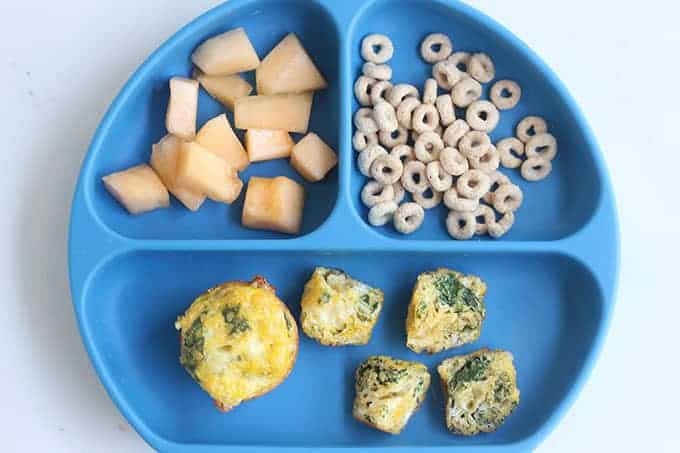
Why won’t my 2-year-old eat?
Outside of illness or teething, a 2-year-old won’t eat for similar power dynamics as above, but they also may be much more sensitive to new foods due to a normal phase called neophobia. This fear of new foods, which usually spikes between 2 and 6 (though it can start at 1 year old), can cause them to refuse foods they once loved and foods you think they will love.
It can also cause them to refuse to want to eat foods mixed together or foods with certain textures.
Try to remember that this is a normal phase of development that will, in all likelihood, eventually pass. Researchers have found you may need to offer a food 8-15 times before a child may willingly try it. In other words, keep on offering the foods you want them to eat regularly in small portions and without pressure, and eat those foods in front of your child.
Because even if they don’t want it today, one day they just might surprise you some day in the future.
(Two of my kids literally refused beans for two years at our weekly taco night. Then one day, they each decided to try them. It took forever, but it wasn’t really a big deal—since they had other foods on the table during those meals they could eat—and they got to that food in their own time.)
For a 2- and 3-year-old, serving meals family style can also help to diffuse power struggles at the table. Simply put the components of the meal in bowls on the table and encourage and help your toddler decide what they’d like to eat. Don’t force bites of everything, unless your child responds positively to that approach, but give them space to choose what looks appealing.
This small amount of ownership over what goes onto their plate can be extremely helpful for strong-willed toddlers. A lot of times, all they really want is to feel like they have some control over their lives.
Try:
- Ask your child “how can I make this yummier?” to see if they can help you figure out how to make their food more appealing.
- Serve meals family style to diffuse power struggles and let them choose which foods to put on their plates.
- In each meal, include 1-2 safe foods they usually like to ensure they always have something to eat if they are hungry.
- Trust their appetites, which may be different than you expect and may vary a lot from day to day.
Why won’t my 3-year-old eat?
A 3-year-old may not eat for reasons similar to a 2-year-old, but they may also have more words to express themselves—so they may be more dramatic in their response. They may not be as hungry as you expect, their appetite may be unpredictable, or they may be worn out by the time dinner rolls around. (That last one is fairly common!)
Three-year-olds also know how hard they need to push to get what they want. Toddlers at this age benefit from set expectations at mealtimes and routine. Which is to say, if you start getting up to get them foods other than the ones you’ve made for dinner, they will continue to demand that you do that.
There’s no rule that says that a toddler needs to eat every single thing you serve for dinner. If they eat some of it, there’s decently good behavior, and minimal crying, that can be defined as a happy meal. Keep the bar low, my friends, and you might find that things are better than you realize!
Try:
- Serve meals family style and let them choose what to eat from the foods you put out.
- Let them choose what to have for dinner from two predetermined options so they feel like they have more power.
- Serve very small portions to start to avoid overwhelming them.
- Include 1-2 safe foods they usually like in each meal to function as safety nets in case they don’t like the main dish.
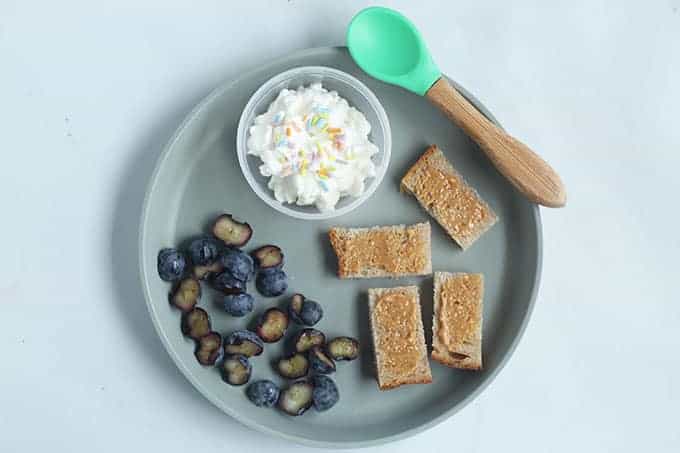
My toddler won’t eat breakfast. Why?
You may simply have a child who isn’t super hungry first thing in the morning. Try to give them a little time to wake up before sitting down for breakfast and/or serve a smaller portion for breakfast and increase the amount of the morning snack.
If your toddler drinks milk or breastfeeds in the morning, it’s possible they have a full little belly that doesn’t have room for food. Keep that in mind if your toddler won’t eat breakfast and adjust expectations accordingly—and perhaps also serve smaller amounts of food.
My toddler is constipated—is that why she won’t eat?
It’s certainly possible! If a little one (or anyone, really) feels uncomfortable in their belly, the idea of putting food into it may not be appealing. In addition to fiber, having enough water is key to alleviating toddler constipation, so offer lots of water to drink throughout the day, along with hydrating produce like melon, cucumbers, berries, and zucchini.
You can also try to include healthy fats (avocado, coconut oil) in their diet, or try a Constipation Smoothie, as they, too, can help food more easily move through the digestive system. And remember: Each kiddo has their own “regular,” so it’s possible that your toddler needs to go once every two or three days…or three times a day.
If your toddler has been holding it all day at school, he may not want to eat dinner because he’s uncomfortable. Try to give him a chance to use the potty, with as much time as is needed to relax, before dinner.
Why does my toddler always want a bedtime snack?
If your toddler has some time between dinner and bedtime, she very well might be hungry before bed. You could either push dinner back a bit or institute a regular bedtime snack. This is a tactic I read about in this book and it makes sense.
If there is always an easy bedtime snack, you won’t have to renegotiate it every night. And you also won’t have to worry about sending your child to bed hungry if you are prone to that particular worry.
I’d just caution against making the snack something they LOVE because kids may recognize that they can simply skip dinner and have the snack they love instead. If a child regularly asks for a snack right after dinner, it may be a habit (or a bedtime delay tactic!), not true hunger. Try “you can be hungry for breakfast” or “if you’re really hungry, you can have a banana.” Both of those phrases can work wonders to suss out true hunger.
Try:
- Find super simple healthy bedtime snacks in this comprehensive post.
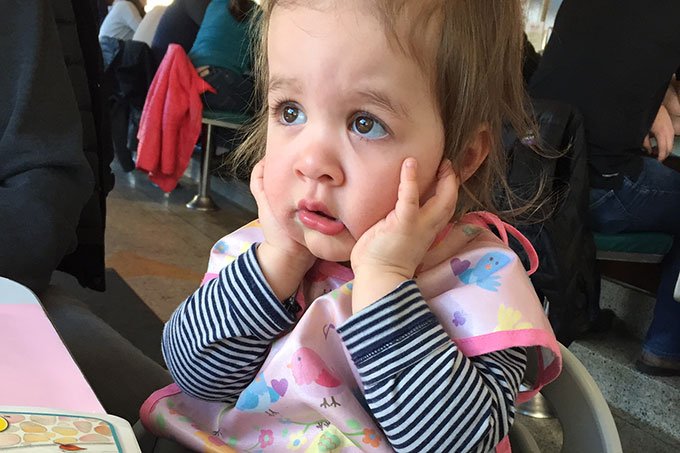
How do I know if my toddler’s eating problems are serious?
Here’s some great advice from Katja and Jenny, the authors of Extreme Picky Eating:
“Ask yourself: What is your underlying fear? The point is to figure out what you are worried about, and then find out if you need to worry (or not) from a book, a doctor, or dietitian. If you don’t need to worry, you can direct your energies to more productive things like supporting your child’s eating. If a problem is discovered, like an oral-motor delay, then you can get that addressed. Studies suggest that between one- and two-thirds of all young children will be described as ‘picky’ in early childhood.”
If there is a growth delay, severe reactions to different or specific textures, regular gagging, difficulty eating or digesting, oral-motor delays, muscular disorders, or any other issues that make eating difficult, reach out to your pediatrician and/or a feeding therapist. They will be best suited to help you work through the issues.
Bottom line: When a toddler won’t eat, it is not a judgement on our cooking skills or our parenting skills. A lot of it has to do with the developmental stage they are in—of learning and exploring boundaries—and simply seeing how much power they have. Hang in there!
Related Recipes
Did I miss anything? Comment if you have a question!
This post is not meant to be a substitute for medical advice. Please consult with a pediatrician or a feeding therapist as needed.
This post was first published April 2018.
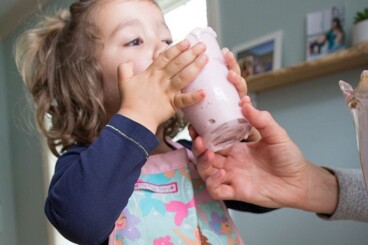
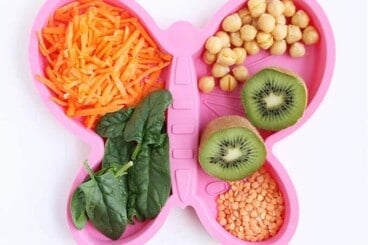
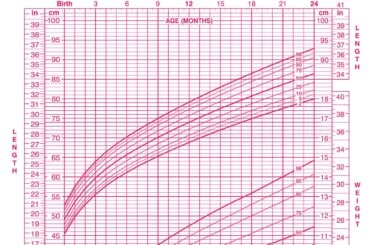


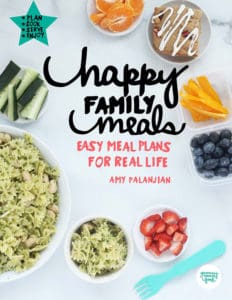

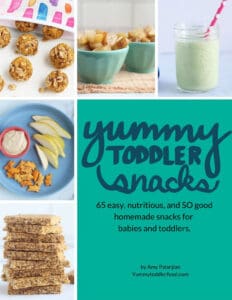














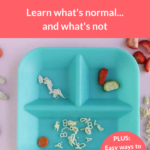
Children are 4 and 2
Serving a balance of items and a safe. When they eat all the safe food and nothing else and want more safe food, what do you recommend? I’d like to have a go to approach because once they learn it they will be ok with it.
Ex: Pork Chop, broccoli, potato, apple sauce. They want more potato.
My current but weak approach is 1 more small serving and then we are done with the potato till next week. Still feels wrong. Either they stop eating asking to leave the table, have a fit at the table or eat a broccoli and meat so they can get more. I just don’t know. We’re all tired at dinner time.
(Other common safes are fries, strawberries or watermelon.)
Thanks.
What is your specific worry about offering additional potato? Perhaps try letting them have more and see if that helps make dinner less exhausting, just as an experiment? Meals are about more than nutrition (though I of course understand that is a concern).
The ‘half of their calories should come from fat’ might be the most frustrating thing to read. I’m actually really good at math, but I don’t know how to calculate nutritional math. And kind of don’t have the mental capacity to understand/take the time to learn it. If the nutrition community could find a different way to communicate these numbers, I would certainly appreciate it, and might be able to implement better nutrition in life.
Yes, that is a good point. Aim to include some healthy fats with each meal or snack, but don’t stress if it doesn’t happen each and every single time, and you should be fine. I will update the text to be more clear and helpful. Appreciate your feedback!
Hi Amy, my two year old refuse to eat for 6 months already. She only wants to drink her formula milk… please help.
Hi- If your child is only drinking formula and no solids, you need to reach out to your pediatrician and work with a responsive feeding therapist to wean off the formula and onto solids. That is a process that will likely need professional supervision, especially at the age of your child, so please try to get that medical help unique to your situation. Good luck!
My 20 month old used to eat very well then one day she stopped. I started noticing that’
she’d pick up the spoon or food to put it her mouth and then just stopped herself. Sometimes I can hear her tummy and I know she’s hungry. She sometimes picks up the food but sets it down and I don’t know if she can’t eat or if it hurts . this week she hasn’t really eaten except for a bit here and there. She doesn’t drink anything other than water or breastf milk .
Has she been sick or teething? If it’s been going on for longer than a few days and she’s not eating anything, I would check in with her pediatrician.
My 19 month daughter is not eating since two days
She drinks water but eat about 1 meal or 2 meals
She is teething. But i need to know when shall i get worried about her portions.
She looks tired, i dont know bec she is not eating well or because she goes to nursery
Thank you
My problem is my 2 year old will not lay down for bed or a nap without milk she will have a melt down even in the car she has to have milk therefore she never eats actual food she is by no means under weight but i go through 3 or 4 gallons of milk a week i dont know what to do!?
If you want to change the behavior, you’d need to have a plan to discontinue offering milk at those times and offer alternative comfort instead and to stick with it and be consistent with your reaction. If milk is interfering with her food consumption, she may not be getting the nutrients she needs from food so you could consider a multivitamin in the meantime. A sleep consultant might be helpful in this situation since the milk and sleep are so tightly connected. Alicia from http://hushlittlebirdie.com/ is wonderful. Good luck!
My 2.7 month toddler won’t eat except for the specific foods that he likes. He would not even open his mouth to try the new food as long as it doesn’t look like the one he is familiar with. Someone advised we shouldn’t give him another food until he tries what we offer . He ate last 12pm , it’s 5.13am now that I am typing this and he has still not ate. I feel bad and even though this person is a child care specialist I feel something is wrong with this approach. He keeps waking up to drink water but won’t eat the food. I am at my wits end. He won’t feed himself. I feel like I left things too late. I don’t know what else to do..
We don’t eat the same things because my husband and I are on specialized diet and he can’t eat what we are eating. My husband and I don’t eat the same things not out of your choice but out of necessity. Help me
Hi. I’m so sorry you’re having challenges. It sounds like you need personalized guidance from a responsive feeding therapist. I’d ask for a referral from your pediatrician or if you are interested in virtual services, let me know at yummytoddlerfood at gmail.com and I can send you some names. Hang in there!
Great article and I love your instagram page! I am having a lot of trouble stopping spoon feeding my capable 16 month old son. We start a meal and usually he will try to start eating something and then after a minute or so gets bored and I just feed him the rest. Sometimes he says done quickly but I still try a few more bites. I was always encouraged to finish my plate growing up and it’s something I have extreme trouble with (people leaving food on their plate.) Even typing this I am seeing the problem is me but how can I feel confident he’s eating enough? He’s a big boy too and smart but sometimes I feel like “why would he let me feed him if he didn’t want it?” I feel at a loss and that I’ve already failed my child in regards to healthy eating habits.
I would encourage you to simply stop feeding him if you really want to and/or definitely when you can tell he’s done and is giving clear signals. You’ll know he’s had enough if he’s growing, gaining weight, and meeting his milestones and if he’s happy and seems good to you. It gets easier the more you do it (though you may always worry and that’s normal too), but the good news is that every day they have a lot of chances to eat so he’ll never go long before he has another opportunity to fill his belly. Remember that kids eat a range of portions and that can vary a lot from day to day. There’s no one right portion size. Follow his cues like you are and trust yourself too. You are not failing! Also: it’s okay to help him when he’s having trouble with utensils. Let me know if I can help more too!
Thanks for the informative post! We are hoping to transition to eating dinner as a family more – our son is 2 and 2months, and really picky. So I’m ready for this to be challenging for a while, which is a shame because cooking and eating dinner is a pleasure my partner and I share and are loath to give up 😉 My concern is – if we put meal components out, won’t he just eat the ones he likes and leave the rest, ie. he would just eat carbs meal after meal? He already practically subsists on bread some days so I am worried this would do nothing to expand his tastes. Any tips? He’s frequently picky about texture (doesn’t like pasta) and mixed things (say, omelette with ham in).
Hi! I guess I would say that you don’t necessarily have to expect that mealtimes will be terrible. I would ask what your main goal from meals is—is it nutrition? Together time? The goal if offering a mix of foods and letting the kids have some say in what they actually eat is to lessen the power issues that often creep up in toddlerhood. So meals can be about being together versus a battle of wills. You can also plate their food, using small amounts if you prefer. Yes, little kids may eat more of some food groups than others (which is normal for their age, they actually need a lot of carbs!), but often times, if you keep mealtime pressure and stress low, things balance out over time and improve as they grow. This can also increase the likelihood that they will try foods on their own, without being forced to, which will make it more likely they’ll eat them again—and when they are old enough to be eating out in the world without you.By eating with you, he will also see you eat a lot of foods, which is helpful for exposure too. There are no guarantees, but this method is helpful for creating happier mealtimes for everyone. (Which I realize may not be everyone’s goal!)
I meant to add that you can also remind him that he can do it himself (even if it’s just with his hands) and sit with him to model eating. That is an important part of this since it’s helpful for kids to see how we eat so they know what is expected of them. And it gives you something else to focus on too, which might help. Hang in there. I still help my 18 month old when he’s having trouble with utensils—this is a long process of learning to eat and you 100% have nothing to feel badly about.
Thank you so much for responding so quickly I really appreciate it and am so grateful to your advice! I will be having my husband hold me accountable to stop and trust my toddler. I think one of the initial problems was I was always worried he would wake up in the night more and breastfeed more (we are still nursing and I’m hoping he will naturally wean by 2) but mostly he sleeps well. Thank you again I’ll reach out if we need more help.
My 2 year old often refuses his meal and says ‘cake’ as he knows that desert comes after! We’ve read conflicting things – either withhold desert if they don’t try their main meal, or don’t do this as it encourages them to think negatively about their main meal. We’ve tried both and also offering fruit only for desert but the behaviour is not changing. At nursery, they always offer desert regardless of whether the main meal is eaten and this does feel right with us, but we worry that we’re rewarding him for not eating his dinner! We have recently started a sticker chart where he gets a sticker if he tries his dinner but not sure that he has made the connection or not. Do you have any advice about whether we should give desert if he doesn’t try his main? By desert, we usually do fruit but occasionally we give home-made cake that he has helped to bake (no sugar) so we’re not giving massively exciting deserts, but I did wonder if we should mix it up and give fruit for snacks and then just something plain for desert like rice cakes?
There is no perfect way, but I prefer to offer dessert with the meal and let the kids eat it in any order they want so that there’s no chance that they’ll see dessert as a reward or better than the main food. I would also suggest that you pick a dessert strategy and stick with it—so maybe that means no dessert during the week, but ice cream on the weekends. Or a small portion of dessert each night. This lets the kids know what to expect and avoids having to renegotiate it each day. There’s more on serving dessert with dinner here.
My toddler asks for the same foods over and over and will even try and get new servings style half of the old serving is still right in front of her. This has only been the last few days, but she’s throwing giant tantrums when I won’t get her another serving.
It’s so hard when that happens. I would stay calm and remind her that she can have more when she’s done or that she can have more tomorrow, that you know she loves that food and you’re so glad she’s enjoying it. And do your best to change the subject to help her focus on something else. It’s possible she’s worried that there won’t be enough or she’s reacting to feeling limited. Depending on her age, how exactly you approach it can vary slightly, but I would do your best to reassure her that there will be more and not take it personally. Toddlers have very little control in their lives and so often mealtime dynamics are a way that they try to exert some!
My 13 month old has always given us a hard time with eating stage 2 foods. She would constantly whine through the whole meal. Now that we are trying real solid table food the whining and refusing to eat is even worse and is extremely frustrating. It’s frustrating because she will chew and swallow bananas in a banana split but she will chew and hoard buttered noodles in her mouth for the entire day unless I give her stage 2 baby food to swallow it with. What do I do?
Is she drinking water with meals? It takes kids time to learn to chew and eat a wide range of foods so I would try to be patient as she is still new at this and offer a food you know she can easily eat with at least one that is more challenging for her at each meal or snack. And do your best to make foods as easy for her to chew as possible. Like cut those noodles up into small pieces and make sure the banana is super ripe and soft. It should start to get easier but allow time for her to learn through this transition to solids.
There are so many articles out there on this subject and they all say the same thing and aren’t helpful. I do most of the things these articles talk about and none of it helps lol. My almost 3 year old just doesn’t want to eat anything but snacks and junk food. She will also tell me what she wants to eat and I make it or provide it and then she doesn’t eat it. But give her some chips and she will eat those right away. All the theories out there are a bunch of crap and don’t work
I would recommend that you read this https://www.yummytoddlerfood.com/the-division-of-responsibility/ which may address the part about who gets to decide what to offer kids. There is nothing anyone can say that will magically make a child a perfect eater or not like snack food (because it is delicious), but there are steps we can take to improve the mealtime dynamics, many of which I mention here. I hope it helps a little.
Hello,
My daughter is 2.5 years old and is never interested in food. Having any meal, may it be breakfast, lunch or dinner is always very stressful. She also does not have milk or any fruit juices either. Doctors recommend to have a variety of raw fruits and veggies. But we are far far away from it. Some days she shows interest in chicken or salmon. But if given regularly she again starts to deny it.
This is happening since she started her solid while she was a baby. Sometimes I just leave her alone with her food (while I am stressing about it in a different room) but the food is always untouched. Please help me with this situation.
It’s not that I keep offering her food every 5 mins. Instead we have only 3 meals (breakfast, lunch and dinner). Still she is never hungry.
Hi. With a child who shows no signs of hunger, I would recommend working with a feeding therapist. Look into https://www.thrivewithspectrum.com/ https://lutzandalexander.com/ https://www.pinneydavenport.com/ who all do virtual work with families.
Thanks for the helpful article! My question relates to our just turned 2 year old throwing food. I’m wondering if maybe our expectations for her portion sizes have not been reasonable and she’s just getting full and then bored so she starts throwing. But she often grabs food off her plate and throws it on the ground. Any suggestions?
I would recommend that you start with smaller portion sizes and that you take her food away or at least hold her arm still and firmly say something like “food is for eating, not for throwing. If you continue to throw your food, this meal is done”. I often remove my child’s food if they are throwing and pause the meal. If they ask for it back, I give it to them, but you need to let them know (repeatedly since this is a normal phase and can go on for a while) that it’s not how we behave at the table. I hope that helps!
Thanks for the great article.
I’d love some advice. My 1-year old son is still breastfed, and I’d like to continue to breastfeed first thing in the morning, before bed, and through the night. However, at this point, I’m willing to fully wean if necessary. The trouble is, he will not eat solid foods at all. We try to make it stress-free and just have a snack container available to him all day. We allow him to play with his food in his high chair at meal time. We offer to put food in his mouth for him, we offer a mix of purées and solids.
He just won’t eat food. Even if we try to force it on him (break my heart!)
The doctor doesn’t seem worried, but I’m concerned about his iron levels and overall nutrition. We’re in the midst of COVID, so we aren’t able to get his blood tested for his various levels.
Any tips? In the meantime, we keep on offering a variety, and then have a little cry once he’s gone to bed.
Hi! Is this new or ongoing? Did he ever eat some food? Does he literally eat zero food or just not a lot? I can email you if that’s easier!
Thanks Amy!
This is not new. He’s never been hugely interested in food. He will eat sometimes, but when he does, it is a very small amount.
Yes, please email me.
Thanks again!
I’m in the same exact situation except he’s formula feed. Any suggestions would be greatly appreciated.
Sorry, which situation are you referring to? And let me know the age of your kiddo too.
Great ready, looking forward to implementing. Question: what are the serving sizes to keep in mind when referencing your chart?
The serving sizes are on the chart as a place to start. Let me know if you have more questions!
Hi my son only 17 months old won’t eat food but I really worry about my son
I would reach out to your pediatrician or a responsive feeding therapist or occupational therapist for help if your child is not eating food at all.